第44章
Some of the foregoing facts strongly support an interpretation which Professor Oldenberg has given of the rules to be observed by a Brahman who would learn a particular hymn of the ancient Indian collection known as the Samaveda. The hymn, which bears the name of the Sakvariˉ song, was believed to embody the might of Indra's weapon, the thunderbolt; and hence, on account of the dreadful and dangerous potency with which it was thus charged, the bold student who essayed to master it had to be isolated from his fellow-men, and to retire from the village into the forest. Here for a space of time, which might vary, according to different doctors of the law, from one to twelve years, he had to observe certain rules of life, among which were the following. Thrice a day he had to touch water; he must wear black garments and eat black food; when it rained, he might not seek the shelter of a roof, but had to sit in the rain and say, Water is the Sakvariˉ song; when the lightning flashed, he said, That is like the Sakvariˉ song; when the thunder pealed, he said, The Great One is making a great noise. He might never cross a running stream without touching water; he might never set foot on a ship unless his life were in danger, and even then he must be sure to touch water when he went on board; for in water, so ran the saying, lies the virtue of the Sakvariˉ song. When at last he was allowed to learn the song itself, he had to dip his hands in a vessel of water in which plants of all sorts had been placed. If a man walked in the way of all these precepts, the rain-god Parjanya, it was said, would send rain at the wish of that man. It is clear, as Professor Oldenberg well points out, that all these rules are intended to bring the Brahman into union with water, to make him, as it were, an ally of the water powers, and to guard him against their hostility. The black garments and the black food have the same significance; no one will doubt that they refer to the rain-clouds when he remembers that a black victim is sacrificed to procure rain; 'it is black, for such is the nature of rain.' In respect of another rain-charm it is said plainly, 'He puts on a black garment edged with black, for such is the nature of rain.' We may therefore assume that here in the circle of ideas and ordinances of the Vedic schools there have been preserved magical practices of the most remote antiquity, which were intended to prepare the rain-maker for his office and dedicate him to it.
It is interesting to observe that where an opposite result is desired, primitive logic enjoins the weather-doctor to observe precisely opposite rules of conduct. In the tropical island of Java, where the rich vegetation attests the abundance of the rainfall, ceremonies for the making of rain are rare, but ceremonies for the prevention of it are not uncommon. When a man is about to give a great feast in the rainy season and has invited many people, he goes to a weather-doctor and asks him to prop up the clouds that may be lowering. If the doctor consents to exert his professional powers, he begins to regulate his behaviour by certain rules as soon as his customer has departed. He must observe a fast, and may neither drink nor bathe; what little he eats must be eaten dry, and in no case may he touch water. The host, on his side, and his servants, both male and female, must neither wash clothes nor bathe so long as the feast lasts, and they have all during its continuance to observe strict chastity. The doctor seats himself on a new mat in his bedroom, and before a small oil-lamp he murmurs, shortly before the feast takes place, the following prayer or incantation: Grandfather and Grandmother Sroekoel (the name seems to be taken at random; others are sometimes used), return to your country.
Akkemat is your country. Put down your water-cask, close it properly, that not a drop may fall out. While he utters this prayer the sorcerer looks upwards, burning incense the while. So among the Toradjas the rain-doctor, whose special business it is to drive away rain, takes care not to touch water before, during, or after the discharge of his professional duties. He does not bathe, he eats with unwashed hands, he drinks nothing but palm wine, and if he has to cross a stream he is careful not to step in the water. Having thus prepared himself for his task he has a small hut built for himself outside of the village in a rice-field, and in this hut he keeps up a little fire, which on no account may be suffered to go out. In the fire he burns various kinds of wood, which are supposed to possess the property of driving off rain; and he puffs in the direction from which the rain threatens to come, holding in his hand a packet of leaves and bark which derive a similar cloud-compelling virtue, not from their chemical composition, but from their names, which happen to signify something dry or volatile. If clouds should appear in the sky while he is at work, he takes lime in the hollow of his hand and blows it towards them. The lime, being so very dry, is obviously well adapted to disperse the damp clouds. Should rain afterwards be wanted, he has only to pour water on his fire, and immediately the rain will descend in sheets.